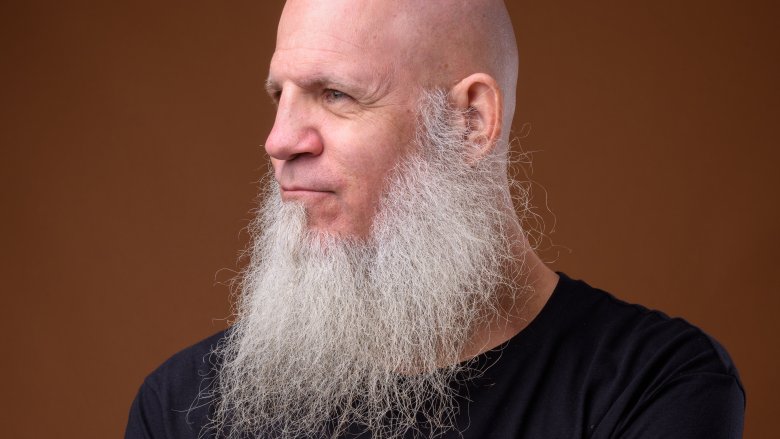Scientists Say This Is Why Our Hair Turns Gray
Gray hair has made plenty of people in the hair dye industry happy, but for many of us it's just a sign that we're about to get saggy and start complaining about kids these days. The moment you find ashen strands in your once vibrant locks, all you can do is hope your head made a mistake or that a spider is hiding somewhere on your noggin and made a web that looks remarkably like hair. And then when you scour your scalp for spiders and don't find a single dead fly or egg sac, all you can do is weep with disappointment and wonder how your hair went from its once-youthful hue to resembling dirty snow.
Or you can dye your hair, but that won't answer your question. Luckily, science can tell us why our hair turns gray.
In a twist that not even M. Night Shyamalan would have seen coming, our hair doesn't turn gray at all. According to Harvard Medical School, "Once a follicle produces hair, the color is set." It's almost like having your hair pre-dyed by nature, except there's only one color to choose from. The cells responsible for giving your hair its color are called melanocytes, which are the same types of cells that determine our skin color, per Newsweek. When you shed hair, special stem cells form new melanocytes for your follicles, so that when your hair grows back it has color instead of just looking like your head got dusty.
Over time those stem cells stop working and buy a house in Florida or whatever stem cells do when they retire, and your hair starts to become the before picture in a Just For Men commercial. So really, your hairs don't change color; your follicles just stop producing color altogether. That process usually starts when you're around 35.
While hair typically "turns" gray because of natural aging, there are things that can make it happen faster such as stress or illness, both of which can cause a condition called "telogen effluvium, which causes hair to shed at about three times faster than normal." (So if you need a reason to stay healthy and dying prematurely isn't motivating you, there's not looking like you're old enough to die maturely). There are also genetic disorders like tuberous sclerosis, which causes benign tumors to grow in your heart, brain, lungs, kidneys, eyes, skin, and good lord can we stop listing them off and just start screaming already? Yikes! A different disorder known as alopecia, which causes you to lose patches of primarily colored hair, can even cause "overnight" graying.
You might be wondering what tells stem cells to produce (or not produce) melanocytes. Luckily, scientists at the University of Texas Southwestern Medical Center accidentally identified the particular proteins responsible for gray hair while trying to study a rare disease that causes nerve cells to develop tumors.
As Time reported in 2017, the researches were meticulously tinkering with the skin cells of everyone's favorite guinea pig — i.e., mice — when they discovered that a protein called KROX20 activates skin cells that turn into a "hair shaft." The creation of the hair shaft triggers the production of another protein called stem cell factor (SCF).
When scientists got rid of KROX20, the rodents went bald, and eliminating SCF turned their fur white. So while scientists may not have figured how to stop your nerve cells from growing horrifying tumors, they at least discovered an elaborate way to embarrass mice. It's not clear whether the researchers turned the fallen fur into coats for the little critters or gave the white ones tiny boxes of Just For Mice. But they absolutely should have. For science, of course.
So basically, your body is an hourglass that can't be turned over. As time passes, parts of you slip away that you can't get back. That graying hair is basically a sign that another part of your anatomy has stopped working the way it used to. That might sound depressing and a little scary, but it's not the end of the world, just a reminder that the end of you is coming. And if you don't want to think about dying yet, consider dyeing instead.
